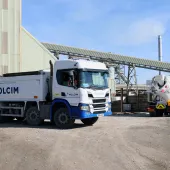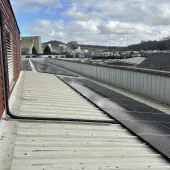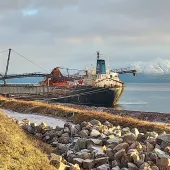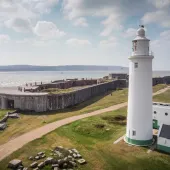A positive environmental impact for London

Emission tests reveal the long-term environmental benefits of using barges on the river Thames
IN February 2018 Aggregate Industries, through their joint venture with Bennett’s Barges, welcomed the first of the new Tideway Class barges to London, with the 1,500-tonne Churchill immediately being put to work at Thames Tideway Tunnel’s (TTT) Carnwath Road site.
Seven more barges followed soon after to complete the new fleet, adding more than 11,000 tonnes of material carrying capacity to the river Thames and bringing major benefits to London, in particular a positive long-term impact on the environment.
Chris Livett, managing director of Bennett’s Barges, said: ‘Without Tideway having confidence in us…to deliver their projects, Londoners would have suffered intolerable road journeys by HGVs.’
On average, one large barge can carry the equivalent to 50 HGVs – and now the key environmental benefits of this have been revealed, following the release of TTT’s air-quality testing results.
In November 2017, air-quality monitoring equipment was installed on board Felix, one of the two sister navtugs designed to use the new barges.
Felix (pictured), which has a 441kW Volvo Penta D16-MH engine, was then tasked with pulling 120-tonne and 250-tonne barges, and emission monitoring was carried out to compare g/tonne km against the equivalent Euro V and Euro VI HGVs.
The pollutant emissions monitored were nitric oxide (NO), nitrogen dioxide (NOx), nitrogen oxides (NO + NO2), carbon monoxide (CO) and carbon dioxide (CO2). Air-quality comparisons of towing larger barges were then modelled based on these data.
In summary, the bigger the barge, the better the benefit to London’s environment, air quality and traffic, with a large number of HGV movements taken off the roads.
‘Look at what we have here [on the Thames]; a four-lane highway with no bicycles, speed bumps or pedestrians,’ explained Chris Livett. ‘All of the major construction projects in London should be using the river Thames, to ensure they are efficient, economical and environmentally friendly.
‘It is indicative of what the future Thames looks like,’ he added. ‘We are all working with the Port of London Authority (PLA) on the Thames Vision, and the aim of transferring more freight by water.’
Aggregate Industries say that while more studies are planned to highlight the many further benefits of using the river, the positive impact on air quality and the environment is already clear to see.









